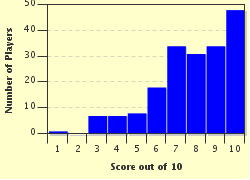Quiz Answer Key and Fun Facts
1. Because my brother's name was James, his childhood favorite was a poem about a young boy named James. Which author, perhaps more familiar to some as the creator of Winnie-the-Pooh than for his poems, wrote the tragic story of James James Morrison Morrison Weatherby George DuPree?
2. 'A Nonsense Alphabet' was delightfully packed with verses that played with sounds and meanings, such as this one:
"B was once a little bear,
Beary!
Wary!
Hairy!
Beary!
Taky cary!
Little Bear!"
What author, more usually thought of in connection with nonsense limericks, brought us the poem of which this is the second verse?
3. Which of these poems, all written by William Makepeace Thackeray, is given here?
"First I saw the white bear, then I saw the black;
Then I saw the camel with a hump upon his back;
Then I saw the grey wolf, with mutton in his maw;
Then I saw the wombat waddle in the straw;
Then I saw the elephant a-waving of his trunk;
Then I saw the monkeys-mercy, how unpleasantly they-smelt!"
4. What word is missing from the start of this poem by Robert Louis Stevenson?
I have a little _____ that goes in and out with me,
And what can be the use of him is more than I can see.
He is very, very like me from the heels up to the head;
And I see him jump before me, when I jump into my bed."
5. Lewis Carroll included a number of poems in his classic books, including one from 'Alice's Adventures in Wonderland' (1865) which starts with this verse:
"'You are old, Father William,' the young man said,
'And your hair has become very white;
And yet you incessantly stand on your head-
Do you think, at your age, it is right?'"
With what couplet does 'You are Old, Father William' finish?
6. One of my favorite A. A. Milne poems concerns a young lady who is throwing a temper tantrum because it's rice pudding for dinner again. What was her name?
7. Theodor Geisel, writing as Dr. Seuss, produced a number of book-length poems for children. Which of them featured Sally and her brother, who get some problematic visitors one rainy afternoon when they have been left alone in the house?
8. Which master of the humorous poem is responsible for this little ditty, titled 'Celery'?
"Celery, raw
Develops the jaw,
But celery, stewed,
Is more quietly chewed."
9. You may not think of J. R. R. Tolkien as a writer of children's poetry, but we used to have 'The Hobbit' as bedtime reading, and enjoyed the many poems and songs to be found in it. Which character was responsible for writing 'Roads go ever on' at the end of the adventure?
10. My favorite poet shared my birthday, and as a horse-mad young girl I loved the poem 'Stopping By Woods on a Snowy Evening', with the horse featuring prominently. Who wrote this poem?
Source: Author
looney_tunes
This quiz was reviewed by FunTrivia editor
agony before going online.
Any errors found in FunTrivia content are routinely corrected through our feedback system.


